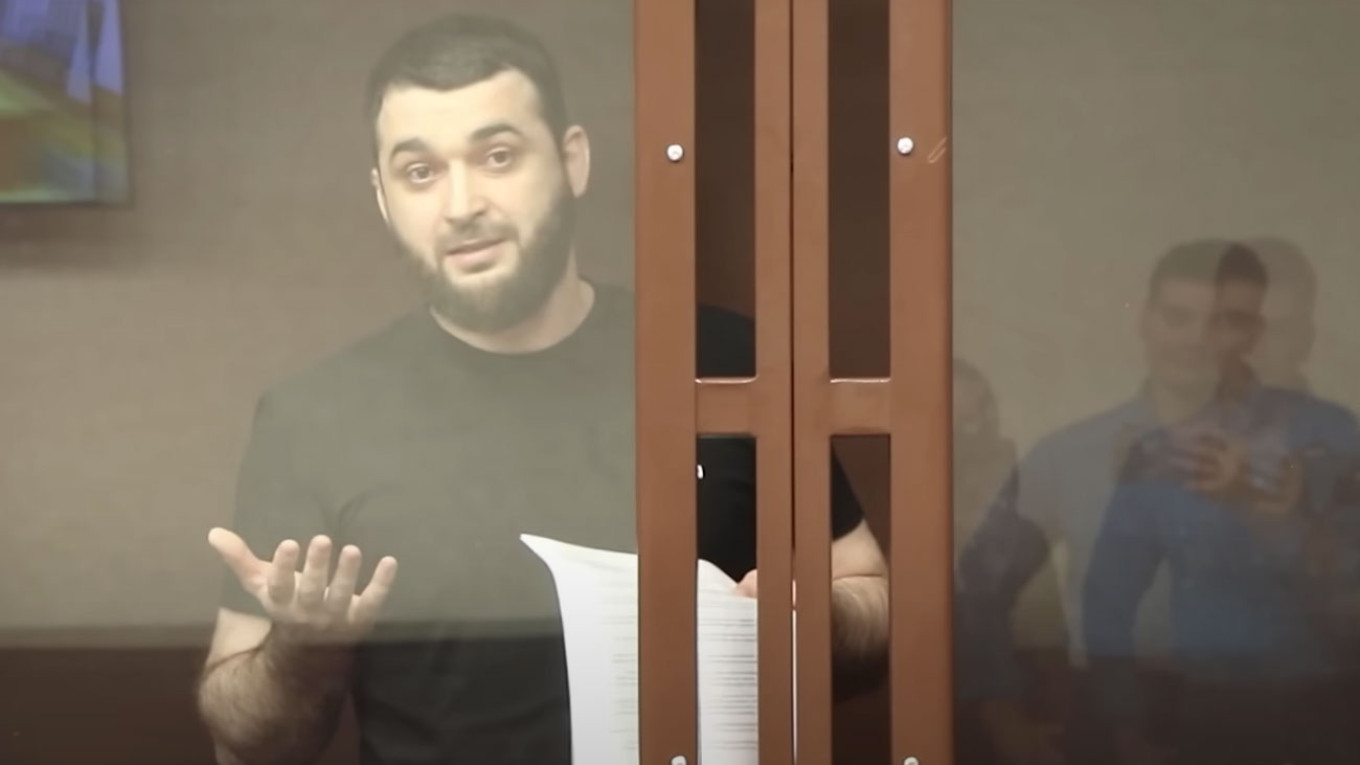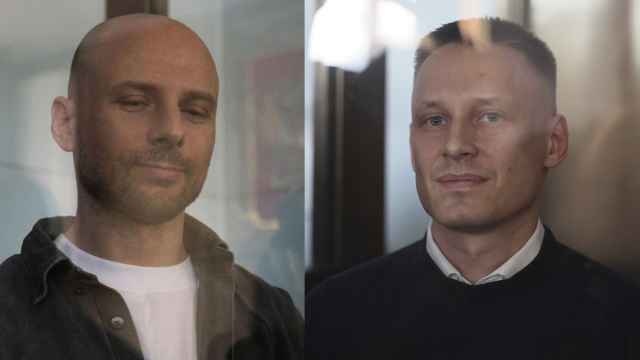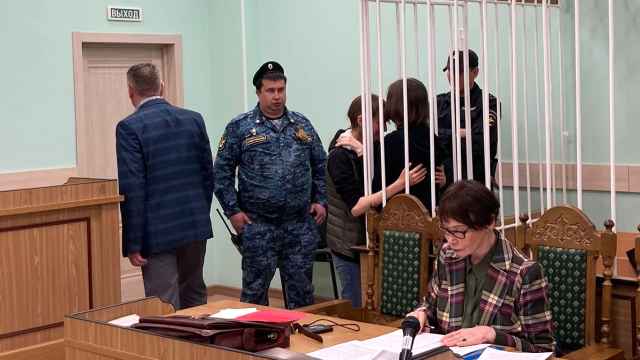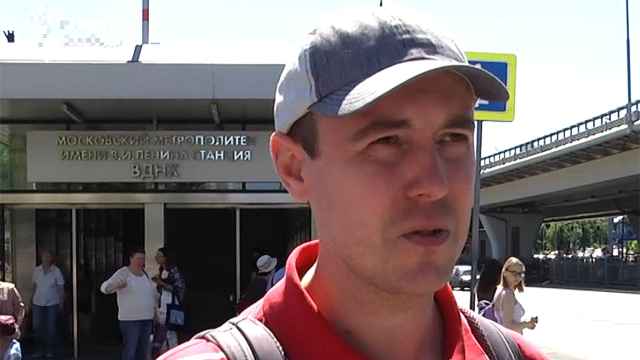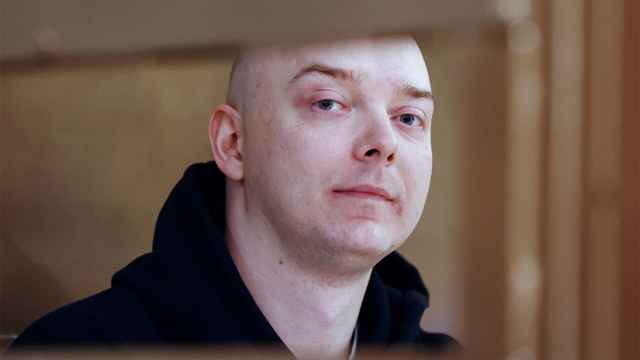Dagestani journalist Abdulmumin Gadzhiev was sentenced on Tuesday to 17.5 years in prison on charges of participating in and financing a terrorist organization.
Gadzhiev, the former editor of the independent news website Chernovik in the North Caucasus republic of Dagestan, was accused of helping to raise funds for the terrorist group ISIS on the orders of the Islamic preacher Abu Umar Sasitlinsky and disguising his activities as charitable work.
He went on trial together with his alleged accomplices, lawyer Abubakar Rizvanov and businessman Kemal Tambiev, who were sentenced to 18 and 17.5 years in prison respectively.
Gadzhiev has denied the charges against him, and Chernovik’s editorial board and other independent journalists have said the charges are retaliation for Gadzhiev’s professional activities.
The Moscow Times has translated and republished his final word in court here:
We kept our word! We have finally reached the finish line. Four years of investigation and legal proceedings are behind us.
Here in the courtroom, we have answered many questions. But one important question remains unanswered. To this day, we do not know who is behind this spectacle.
They say it was an attempt to shut down the Chernovik newspaper and silence independent media in the republic [of Dagestan]. Some see it as a sign from the higher-ups for a certain part of the Caucasian youth. Or perhaps it was just some desk-bound clerk, an incompetent operative, trying to make a name for themselves by simulating vigorous activity in the fight against terrorism.
Today, standing here, I can say with confidence that whoever it was did not achieve their goal.
Yes, the Chernovik newspaper is closed. But they say print publications are out of style these days. In the past few years, the Chernovik Telegram channel has become a platform for the people, helping to solve their problems. And its number of subscribers exceeds the print version's circulation fivefold.
Yes, we spent four years in prison. But these were the most productive years of our lives, during which, with the help of the Almighty and thanks to public support, we managed to open society’s eyes to many problems, shedding light on the legal process and releasing hundreds of publications from behind bars. It was here that I truly had the opportunity to engage in journalistic activities.
Three years ago, when they brought the 40 volumes of the criminal case into our cell at the Makhachkala pre-trial detention center, I wrote (quote):
"Despite the unusual nature of our trial due to the public resonance and the obvious innocence of the accused, investigators and operatives have not changed their approach.
Forty volumes of trash. Logically inconsistent, full of contradictions and errors — these texts were obviously written by people unaccustomed to being scrutinized or evaluated for their work. We intend to change this criminal tradition.
We will conduct our own investigation of the investigation conducted by investigator Nadir Televov in order to make its work completely transparent. No matter what verdict the Rostov Military Court delivers, we will leave no doubt about our innocence" (end of the three-year-old quote).
We kept our word. Today, the public not only has no doubts about our innocence, but also views our trial as an example of the glaring lawlessness and falsification of criminal cases in our society.
This case was a fake from start to finish.
The pretext for my arrest was fake when they detained me early in the morning based on Kemal's interrogation, which took place late in the evening, 15 hours later.
The descriptions of us by local police officers from different cities in Russia were fake, as they contained identical spelling errors.
The accusation of our involvement in terrorist organizations, the names of which we never heard from any witnesses or saw any evidence of in court, turned out to be fake. The investigator chose these organizations simply because they were the first on the FSB website's list.
The accusation that my work at the Chernovik newspaper was aimed at promoting the Ansar Foundation was also fake. In 10 years of the newspaper’s work, this foundation was mentioned only once in connection with a related news event.
The accusation against Kemal Tambiev of founding the Aman Foundation turned out to be fake. The real founders, as we learned in court, had never heard of him.
The claim that I supposedly transferred 16,000 rubles to ISIS, which turned out to be an ordinary purchase of plane tickets, was fake.
The house in the village that was allegedly acquired with ill-gotten gains and planted on me, Abubakar Rizvanov, and our relatives also turned out to be fake.
Almost all of the prosecution witnesses were fake, and one by one they came over to our side, making it unnecessary for me to call witnesses for my defense.
The accusation of incitement to terrorist organizations on the pages of the Chernovik newspaper was also fake. Three expert examinations found no indication of terrorism.
Even many of the court hearings themselves were fake.
I remember one time when a prosecutor traveled from Makhachkala to Rostov to question a witness who had no connection to us about a group of people who had no connection to us, building something on a territory that had no connection to us. All the prosecutor wanted to prove was that these people had beards. However, the witness stated that they did not have beards.
I remember sitting in court, watching all of this unfold, and thinking: What is even going on here? A whole entire prosecutor traveled 900 kilometers from Dagestan to prove that unknown people had beards, and they turned out to be clean-shaven!
We listened to witnesses who admitted they had "water in their heads." We listened to an investigator who explained the incorrect time stamps in dozens of protocols by saying that his watch had been wrong for a whole year.
We reached a new level of planting physical evidence. In the past, when fabricating criminal cases, [law enforcement] would plant weapons or drugs. They planted a house on us!
The most interesting thing is that here, in the courtroom, we identified the owner of this house. However, the prosecution machine is so inflexible that the prosecutor still demanded that the house be confiscated on behalf of the state.
In over two years of the judicial process, I did not see a single act of spontaneity from the prosecutor, not a single deviation from the script, not a single original thought. Even with two weeks to prepare his response, he did not think to refrain from demanding the confiscation of someone else's house planted on us by the investigator.
This is not just the logic of this specific prosecutor or the logic of the prosecutor's office as a supervisory body. It is the philosophy of the entire law enforcement system of this country, perfectly described by Leo Tolstoy in "Resurrection," and which has not changed at all in 150 years.
In conclusion, I would like to thank everyone who supported us throughout this time. Thanks to you, we not only do not consider these years to have been wasted but, as I mentioned earlier, we consider them the most productive in our lives. At least two out of the three of us think so, I won't point fingers at the third now...
As one of the great legal scholars of the past, Sheikh-ul-Islam Ibn Taymiyyah, who also suffered unjust persecution by the authorities, once said:
"What can my enemies do to me? My garden is my heart! If they imprison me, it will be solitude with the Almighty. If they kill me, it will be a martyrdom on His path, and if they expel me, it will be a journey."
In any case, no matter how it was in prison... I hope that very soon, all three of us will be free.
Thank you.
A Message from The Moscow Times:
Dear readers,
We are facing unprecedented challenges. Russia's Prosecutor General's Office has designated The Moscow Times as an "undesirable" organization, criminalizing our work and putting our staff at risk of prosecution. This follows our earlier unjust labeling as a "foreign agent."
These actions are direct attempts to silence independent journalism in Russia. The authorities claim our work "discredits the decisions of the Russian leadership." We see things differently: we strive to provide accurate, unbiased reporting on Russia.
We, the journalists of The Moscow Times, refuse to be silenced. But to continue our work, we need your help.
Your support, no matter how small, makes a world of difference. If you can, please support us monthly starting from just $2. It's quick to set up, and every contribution makes a significant impact.
By supporting The Moscow Times, you're defending open, independent journalism in the face of repression. Thank you for standing with us.
Remind me later.


